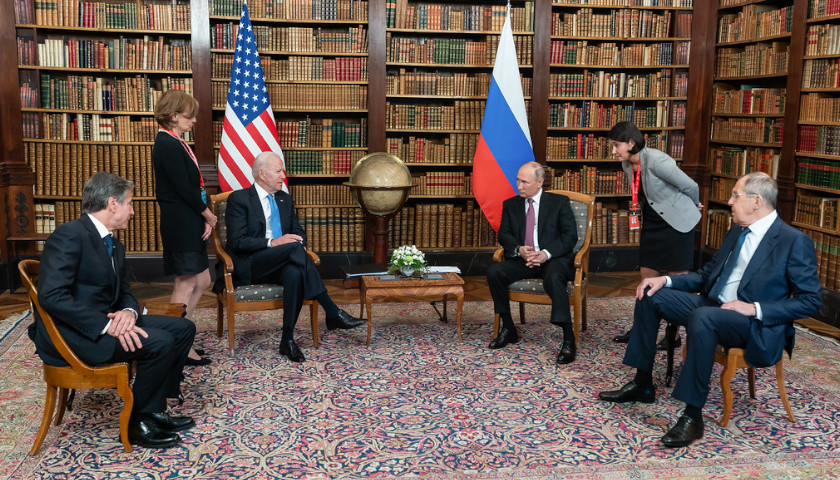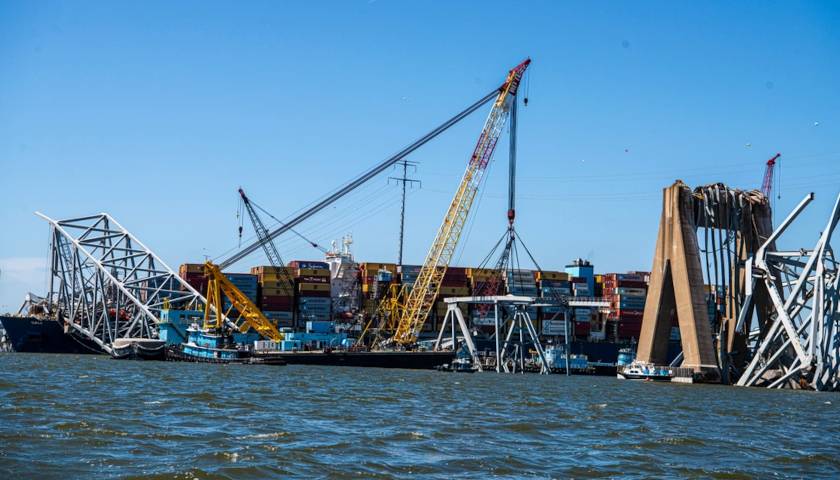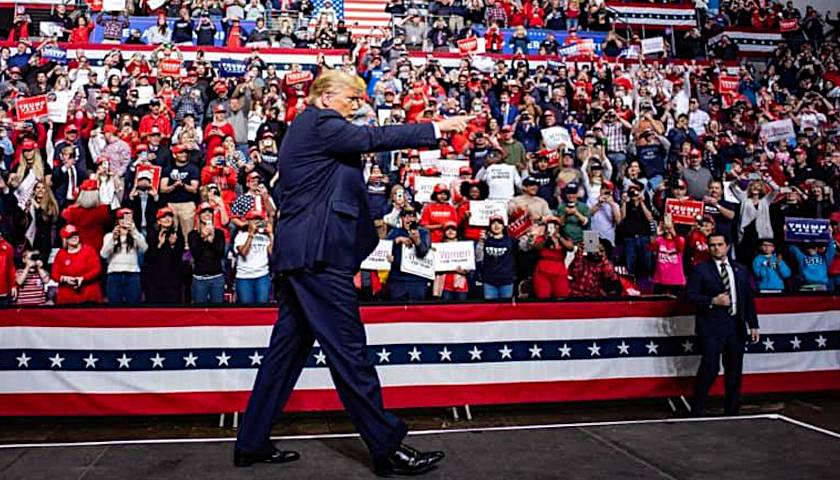by Philip Wegmann
There is always a tweet, so says the online aphorism, developed during the chaotic Trump years, that now seems to hold true across administrations and perhaps even with increased significance after a Russian strongman decided to invade an eastern European neighbor over the holiday weekend.
The Russian in question is Vladimir Putin. The country invaded, Ukraine, or more specifically the so-called Donetsk and Luhansk People’s Republics that Russia recently recognized diplomatically. And the tweet, well, that came from Joe Biden.
It was sent February 21, 2020, and Biden, or someone on the Biden campaign, wrote: “Vladimir Putin doesn’t want me to be President. He doesn’t want me to be our nominee. If you’re wondering why — it’s because I’m the only person in this field who’s ever gone toe-to-toe with him.”
Conservatives were all-too-happy to dig up that old tough guy talk in light of recent Russian bad behavior. But now, for better or worse, the president does find himself toe-to-toe with Putin. It is a moment he promised again and again that he was made for. He was so confident, he even used it to solicit campaign donations in 2020.
“I’m going to stand up to him,” Biden told his supporters in a fundraising video before he had secured the nomination. “He’s a bully.” Send me to the White House, and Putin will know “his days of tyranny and trying to intimidate the United States and those in Eastern Europe are over.”
Russia was an inflection point Biden was happy to highlight during the presidential campaign. “I’ve gone head-to-head with Putin and made it clear to him we’re not going to take any of his stuff,” Biden said during the first 2020 presidential debate. About his opponent, former President Trump, Biden said “He’s Putin’s puppy.”
Before that, when the Washington Post reported in June of 2020 that Russia was offering bounties to Taliban-linked militants to kill U.S. and coalition military personnel in Afghanistan, Biden slammed Trump as a Russian stooge.
“Not only has he failed to sanction or impose any kind of consequences on Russia for this egregious violation of international law, Donald Trump has continued his embarrassing campaign of deference and debasing himself before Vladimir Putin,” Biden told supporters during a virtual town hall. And even worse, Biden charged, Trump was unpatriotic: “His entire presidency has been a gift to Putin, but this is beyond the pale. It’s a betrayal of the most sacred duty we bear as a nation, to protect and equip our troops when we send them into harm’s way.”
The CIA later admitted in April of 2021, long after the U.S. presidential campaign had ended, that their intelligence on the allegations was of “low to moderate confidence.” Regardless of that report, Biden can confidently say that he understands Putin and Russia better than most. He has spent decades studying and working on the geopolitical issue.
“I’m not a big fan of Putin’s,” then-Sen. Biden said back in 2006. He was the incoming chairman of the Foreign Relations Committee at the time, and he made his opinion clear on Fox News, saying that the United States “should have a direct confrontation with Putin politically about the need for him to change his course of action.”
Sitting right next to Biden: Sen. Lindsey Graham. The Republican nodded along, telling newsman Chris Wallace, “I think Joe is right on.”
Confrontation followed, despite the message Biden would deliver in Munich as vice president. In what was billed as the first major foreign policy address of the Obama administration, Biden said in 2009 that, when it came to Russia, “it is time to press the reset button.” Not unlike now, Biden also warned that when it came to Ukraine’s desire to join NATO, “sovereign states have the right to make their own decisions and choose their own alliances.”
The two men would later come face to face after Russian separatists downed a Malaysian airliner over Ukraine in 2011. All 298 of the civilians onboard died. According to Biden, he didn’t waste much time with diplomatic niceties.
“I said, ‘Mr. Prime Minister, I’m looking into your eyes, and I don’t think you have a soul,’” Biden recalled in a 2014 interview with the New Yorker’s Evan Osnos. This was an obvious reference to a famously over-optimistic initial assessment of Putin rendered by George W. Bush. But Osnos wondered about it. Did Biden really say those words, the reporter asked him, or was Biden being characteristically braggadocious?
“Absolutely, positively,” Biden insisted, adding improbably that Putin, then the Russian prime minister, replied in kind. “And he looked back at me, and he smiled, and he said, ‘We understand one another.’”
The foreign policy experience that was a selling point for Biden during the campaign was, for a while, a strong point once in office. One month after he became president, according to polling by Gallup, 56% of Americans approved of his handling of foreign affairs. More than a year in and after a chaotic withdrawal from Afghanistan, that number has dropped to about 40%. In the meantime, Biden has spoken with Putin several times, over video conference from the White House and in person at a summit in Geneva, alternately pressing him to do more to stop ransomware attacks on the United States from Russia and warning him not to invade Ukraine.
Neither entreaty proved definitive, but after the Russian military deployed to two breakaway regions of eastern Ukraine this week, the president delivered more than warnings and harsh words.
On Tuesday, Biden leveled sanctions against Russian financial institutions, individuals, and families in Putin’s inner circle, and even the nation’s sovereign debt. Also, and in consultation with the United States, Germany blocked the Nord Stream 2 natural gas pipeline, a boon to Russia’s fossil fuel dependent economy.
“We’ve demonstrated the potency of our financial sanctions,” Deputy National Security Adviser Daleep Singh told reporters. “And make no mistake, this is only the sharp edge of the pain we can inflict.”
Biden spoke from the East Room to announce those sanctions earlier Tuesday, and he made clear that he believes Putin’s territorial ambitions have not been satisfied. “He is setting up a rationale to take more territory by force, in my view,” the president said.
“This is the beginning of a Russian invasion of Ukraine,” he added, meaning, in all likelihood, that the conflict with Putin that Biden promised he was prepared to handle is just starting.
– – –
Philip Wegmann is a reporter for RealClearPolitics.





